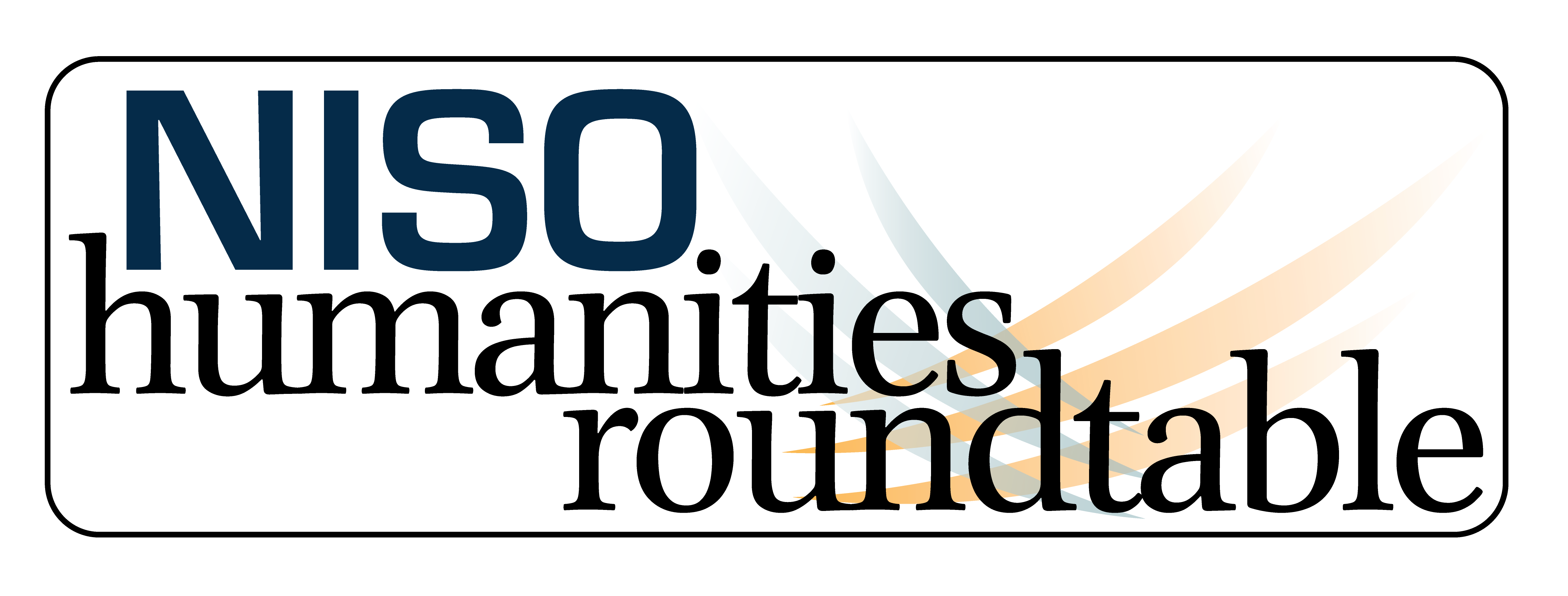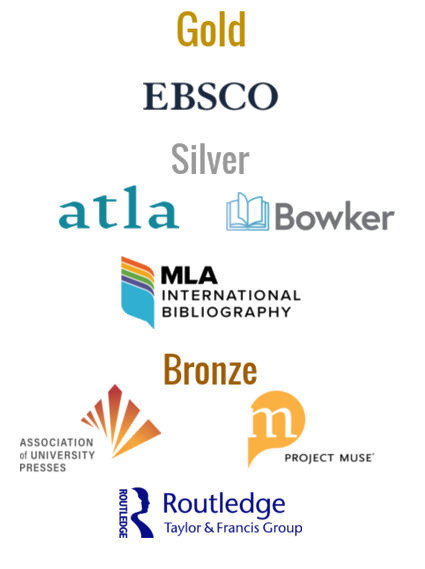2023 NISO Humanities Roundtable
Scope

This day-length conference continues in the tradition of the previous 20 years by drawing on the expertise of scholarly associations, university presses, librarians, researchers, and more to provide participants with exciting discussions around the needs of those working in the humanities. This year’s program will examine how the transition to open access and the emergence of new technologies will shape the future of these disciplines. In addition to thought-provoking keynotes and expert panels, the event will include plenty of time for interactivity and discussion, providing a forum for stakeholders to come together and identify trends, share best practices, and set priorities that reflect the needs of the humanities community.
Confirmed speakers: Ramón Alvarado, Assistant Professor of Philosophy and Data Science Initiatives & Data Ethics Coordinator, University of Oregon; Ashley Champagne, Director of the Center for Digital Scholarship, Brown University Library; Divine Fuh, Director, HUMA, University of Cape Town; Bryn Geffert, Dean of Libraries and Professor of History, University of Vermont; Jason Griffey, Director of Strategic Initiatives, NISO; James Huckenpahler, Professorial Lecturer & Instructional Lab Coordinator, Digital Studios, Studio Arts Program, George Washington University; Katherine McDonough, Senior Research Fellow, The Alan Turing Institute; Lucy Montgomery, Professor of Knowledge Innovation, Curtin University; Roopika Risam, Associate Professor in the Digital Humanities and Social Engagement Cluster, Dartmouth College; Ben Schmidt, Vice President of Information Design, Nomic; Lauren Tilton, Associate Professor of Digital Humanities, University of Richmond; and Charles Watkinson, Associate University Librarian for Publishing/Director, University of Michigan Press.
Agenda:
10:30am - 10:45 am: Welcome (15 minutes)
First Half of the Day: Open Access of Humanities Monographs
10:45am - 11:15am: Keynote Speaker (30 minutes) - Charles Watkinson
11:15am - 12:00pm: Panel Discussion (45 minutes) Moderator: Bryn Geffert, Panelists: Ashley Champagne, Divine Fuh, and Roopika Risam
12:00pm - 12:10pm: Quick Break (10 minutes)
12:10pm - 12:40pm: Breakouts (30 minutes)
12:40pm - 1:10pm: Discussions (30 minutes)
1:10pm - 1:40pm: LUNCH BREAK (30 minutes)
Second Half of the Day: AI in Generative Content & Authorship
1:40pm - 2:10pm: Keynote Speaker (30 minutes) - Katherine McDonough
2:10pm - 3:10pm: Panel Discussion (45 minutes with 15 minute Q+A) Moderator: Jason Griffey, Panelists: Ramón Alvarado, James Huckenpahler, Ben Schmidt; and Lauren Tilton
3:10pm - 3:20pm: Quick Break (10 minutes)
3:20pm - 3:50pm: Breakouts (30 minutes)
3:50pm - 4:15pm: Discussions (30 minutes)
4:15pm - 4:30pm: Summary (30 minutes)
7:00pm - 7:45pm: Evening Presentation - Lucy Montgomery
7:45pm - 8:30pm: Conclusion and Final Thoughts
Thanks to Our Sponsors!
To join our sponsors in supporting this event, contact nisohq@niso.org

Event Sessions
10:30am - 10:45am: Welcome
Speaker
10:45am - 11:15am: Opening Keynote
Speaker
11:15am - 12:00pm Noon: Panel Discussion
Speakers
Shared Resource:
American Library Association - Labeling Systems: An Interpretation of the Library Bill of Rights
12:00pm - 12:10pm: Break
12:10pm - 12:40pm: Breakouts
12:40pm - 1:10pm: Discussions
1:10pm - 1:40pm: Lunch Break
1:40pm - 2:10pm: Afternoon Keynote
Speaker
Shared resources:
Felt: MapReader Launch Output Examples
The Alan Turing Institute: MapReader Railspace and Buildings dataset outputs
2:10pm - 3:10pm: Panel Discussion with Q+A
Speakers
Shared Resources:
Maps with a sense of the past: what are synthetic maps, and why do we love them? by Chris Fleet, Zekun Li, Katie McDonough, and Valeria Vitale.
DALL·E 2 - an AI system that can create realistic images and art from a description in natural language.
AI and the American Smile: How AI misrepresents culture through a facial expression
Explain xkcd - 2494: Flawed Data
Borges’ ‘On Rigor in Science’ — A New Annotated Translation
NOMIC: Vertex AI embeddings of stack overflow posts
Collection Space Navigator: An Interactive Visualization Interface for Multidimensional Datasets
Yale DH Lab PixPlot - PixPlot facilitates the dynamic exploration of tens of thousands of images. Inspired by Benoît Seguin et al.’s paper at DH Krakow (2016), PixPlot uses the penultimate layer of a pre-trained convolutional neural network for image captioning to derive a robost featurization space in 2,048 dimensions.
Nothing, Forever - an American interactive procedurally generated animated sitcom broadcast as a livestream.
MusicGen - a simple and controllable model for music generation presented at: “Simple and Controllable Music Generation”.
AI won an art contest, and artists are furious
Exclusive: OpenAI Used Kenyan Workers on Less Than $2 Per Hour to Make ChatGPT Less Toxic
What kind of trust does AI deserve, if any? by Ramón Alvarado
Artists Are Suing Artificial Intelligence Companies and the Lawsuit Could Upend Legal Precedents Around Art By Shanti Escalante-De Mattei
Wikipedia Spotlight: Timnit Gebru - an Ethiopian-born computer scientist who works on algorithmic bias and data mining. She is an advocate for diversity in technology and co-founder of Black in AI, a community of Black researchers working in artificial intelligence (AI).
Data Cartels - The Companies That Control and Monopolize Our Information by Sara Lamdan
3:10pm - 3:20pm: Break
3:20pm - 3:50pm: Breakouts
3:50pm - 4:15pm: Discussions
4:15pm - 4:30pm: Summary and Conclusion
7:00pm - 7:45pm: Evening Presentation
Speaker
We strive to engage a global audience and have invited a speaker as an extension to the program!
Dr. Lucy Montgomery is Professor of Knowledge Innovation at Curtin University, where she leads the Innovation in Knowledge Communication research program at the Centre for Culture and Technology. Montgomery’s current projects include the Curtin Open Knowledge Initiative, a major strategic research initiative that is bringing together publicly available data about the openness of global research landscapes and lowering barriers to its use; as well as the Mellon Foundation funded Book Analytics Dashboard Project (2022-2025), which is creating a sustainable OA book focussed analytics service that supports diversity in the voices, perspectives, geographies, topics and languages made visible through OA books.
7:45pm - 8:30pm: Conclusion and Final Thoughts
Additional Information
NISO assumes organizations register as a group. The model assumes that an unlimited number of staff will be watching the live broadcast in a single location, but also includes access to an archived recording of the event for those who may have timing conflicts.
NISO understands that, during the current pandemic, staff at a number of organizations may be practicing safe social distancing or working remotely. To accommodate those workers, we are allowing registrants to share the sign-on instructions with all colleagues so that they may join the broadcast directly.
Registrants receive sign-on instructions via email on the Friday prior to the virtual event. If you have not received your instructions by the day before an event, please contact NISO headquarters for assistance via email (nisohq@niso.org).
Registrants for an event may cancel participation and receive a refund (less $35.00) if the notice of cancellation is received at NISO HQ (nisohq@niso.org) one full week prior to the event date. If received less than 7 days before, no refund will be provided.
Links to the archived recording of the broadcast are distributed to registrants 24-48 hours following the close of the live event. Access to that recording is intended for internal use of fellow staff at the registrant’s organization or institution. Speaker presentations are posted to the NISO event page.
Broadcast Platform
NISO uses the Zoom platform for purposes of broadcasting our live events. Zoom provides apps for a variety of computing devices (tablets, laptops, etc.) To view the broadcast, you will need a device that supports the Zoom app. Attendees may also choose to listen just to audio on their phones. Sign-on credentials include the necessary dial-in numbers, if that is your preference. Once notified of their availability, recordings may be downloaded from the Zoom platform to your machine for local viewing.
Event Dates
–
Location
Timing shown for this event is Eastern Daylight Time. All NISO events follow the practices of the Eastern Time Zone (US & Canada).